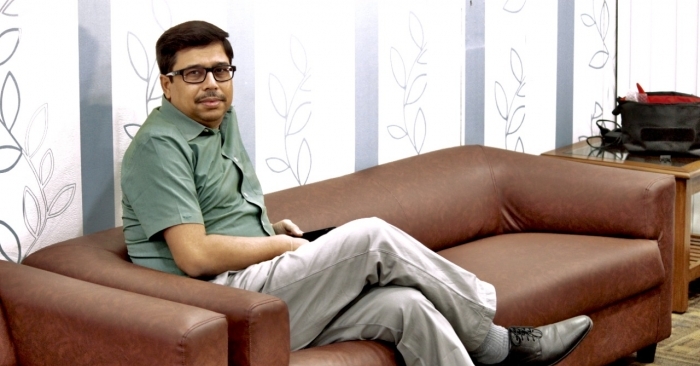Our automation spends would be close to 500 crore in next three years
Amitava Saha, CEO and founder of Xpressbees, talks to Libin Chacko Kurian about the potential of RFIDs, the upcoming revolution in the B2B express logistics, capital efficiency, new clients in pharma and fashion industries and plans for China, South East Asia, and Middle East expansion.

Present across 2,500 cities in India, Pune-headquartered XpressBees is one of the biggest express logistics companies in the country.
Amitava Saha, CEO and founder of XpressBees, talks about the potential of RFIDs, the upcoming revolution in the B2B express logistics, capital efficiency, new clients in pharma and fashion industries and plans for China, South East Asia, and Middle East expansion.
How big is XpressBees in terms of packages you deliver every day or pin codes you serve compared to competitors?
We serve around 17,000 plus pin codes delivering close to eight lakh packages every day. If you're doing competitive benchmarking E-com Express and we are almost similar in size. While Delhivery is probably slightly bigger than us as far as e-commerce, B2C packages are concerned.
In our last interview with you in 2018, you said that you aim to grow 5x in new next two years. How far you have reached?
We're close to four and a half x of what we were then in terms of turnover.
Compare the Alibaba investment of ₹224 crore in 2017 and the new ₹800 crore in November 2020?
When Alibaba investments came in, we were moving 1.3 lakh shipments per day and were present across 4,000 to 5,000 pin codes. At that time, the use of the funds was primarily to grow the scale of the business to increase our reach. However, this one will be used more in developing technology and investing in automation.
We are doing a humongous amount of automation by deploying multiple sorters which can sort 24,000 parcels per hour over the next few months. The automation spends of the company itself would be around close to 500 crore over the next three years.
Tell us more about your technological ambitions.
Logistics is becoming heavily tech-dependent. We already have our entire operations working on our in-house build technology and we are building the technology on the last mile as well. We'll be spending on the next level of technology like geospatial mapping or giving better visibility to our customers on exactly where the parcel is.
As of today, once the shipment is out for delivery, we can predict when it will be making the delivery, break it down to a four-hour window followed by a two-hour window and give accurate information to the customer to not only make it convenient but also to ensure a higher hit rate especially if you're delivering a COD (cash on delivery) shipment and you need the customer to be at his doorstep with the money.
By investing in technology, we're also building up our B2B express business. Just like technology played a major role in the evolution of B2C businesses, where traditional players like Blue Dart and DTDC lost out. In the next few years is we are going to see an evolution in the B2B business and it will be led by operators who understand or use technology very well to bring in efficiency. Once you make the operation machine-dependent it will further bring down the cost as well.
You were also talking about venturing into machine learning and data science in our previous interview. How far you have penetrated?
Machine learning and data sciences are still in their nascent stages. These are just two to three years old. Other technologies are geospatial mapping, IoT (Internet of Things) and RFIDs.
RFID is currently quite expensive for logistics. However, the moment we can bring down the cost of RFID, it's going to be very useful. Today the minimum cost of an RFID tag is 10 Indian Rupee which is not viable. The moment we can bring it down to a couple of paise, it will be very useful to eliminate scans and ensure automatic tracing.
A lot of logistics companies spend a lot of time scanning and screening as we do scan based tracing. So once we move into RFID in future, we will automatically know when the package moves in or out.
The government of India recently deregulated geospatial data. Will it help your business?
Obviously, it will help the businesses to use the data and to bring in efficiency. We do it in a very small manner, but we want to do it much more extensively. For example, today, all our hub locations are mapped out, but tomorrow we want to track the boys on the field continuously. We will be making more investments into it so that we can give a more predictable outcome on the delivery timings.
How well funded is XpressBees? Are you looking for more funding right now?
Right now there is no need for funding and we are very well-capitalised. We are also, on our bottom line perspective, very close to breaking even. In fact, most of the months in the last financial year, we were EBITDA positive.
So, we need funds only for two reasons,
- Automation of building scale into the business, which was more of making a long term investment rather than funding business losses.
- We are looking at some acquisition and inorganic growth as well.
How you gain capital efficiency compared to your competitors?
Because of the use of technology very early in the business. We have always had an in-house technology team operating our in-house platform, which had built-in efficiency.
We have said that we want to be efficient first, and then we scale. A lot of businesses think of scale first and efficiency later. We come from the other side of the table.
What happened to your plans to expand to China, Southeast Asia and the Middle East?
We have tied up with some of the largest players in these geographies and we did some technical integration as well. However, because of the Covid-19 pandemic, we have put those plans on hold for now. We'll revisit them as the situation normalizes. Considering the challenges and the growth we're seeing in the domestic market, we’ll focus on India for the next year and a half.
Who are your clients and what are the new trends popping up particularly from your clients perspective?
Without exception, all major e-commerce companies are our clients. Other than e-commerce, when we opened up from Covid we got a lot of interest from the pharmaceutical and fashion sectors because the traditional supply chains were broken. We've got a lot of pharma and fashion clients and these two verticals have grown significantly for us. We're also getting into other areas in B2B express logistics like engineering, automotive, industrials etc.
What we could expect from you in the next year?
We plan to expand our reach to cover every pin code of the country by mid of next year. We're getting into newer areas of business like B2B express. While B2C continues to be more efficient, there'll be new thrust areas of B2B warehousing. Post-Covid, omnichannel is one of the top things on the list of every CEO or CFO in the retail industry. Bring in smart technology to support omnichannel and automating the warehouses are the few areas that we'll work upon.
This interview was originally published in Indian Transport & Logistics News' May - June 2021 issue.

Libin Chacko Kurian
Assistant Editor at STAT Media Group, he has six years of experience in business journalism covering food & beverage, nutraceuticals and now logistics. His current passion is to understand the nuances of global supply chains and their current turmoil. Outside work, he is also interested in philosophy, history, birding and travelling. Mail him: libin@statmediagroup.com Follow on LinkedIn


